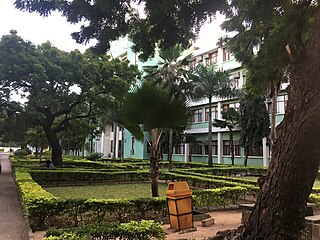
Dar es Salaam is the largest city and financial hub of Tanzania. It is also the capital of the Dar es Salaam Region. With a population of over eight million people, Dar es Salaam is the largest city in East Africa and the sixth-largest in Africa. Located on the Swahili coast, Dar es Salaam is an important economic center and one of the fastest-growing cities in the world.

The University of Dar es Salaam (UDSM) is a public university located in Ubungo District, Dar es Salaam Region, Tanzania. It was established in 1961 as an affiliate college of the University of London. The university became an affiliate of the University of East Africa (UEA) in 1963, shortly after Tanzania gained its independence from the United Kingdom. In 1970, UEA split into three independent universities: Makerere University in Uganda, the University of Nairobi in Kenya, and the University of Dar es Salaam in Tanzania.

Dar es Salaam Region is one of Tanzania's 31 administrative regions and is located in the east coast of the country. The region covers an area of 1,393 km2 (538 sq mi). The region is comparable in size to the combined land and water areas of the nation state of Mauritius Dar es Salaam Region is bordered to the east by Indian Ocean and it is entirely surrounded by Pwani Region. The Pwani districts that border Dar es Salaam region are Bagamoyo District to the north, Kibaha Urban District to the west, Kisarawe District to the south west and Mkuranga District to the south of the region. The region's seat (capital) is located inside the ward of Ilala. The region is named after the city of Dar es Salaam itself. The region is home to Tanzania's major finance, administration and industries, thus the making it the country's richest region. The region also has the second highest Human Development Index in the country after Mjini Magharibi. According to the 2022 census, the region has a total population of 5,383,728 and national census of 2012 had 4,364,541. The region has the highest population in Tanzania followed by Mwanza Region.

Established in 1964, the Aga Khan Hospital, Dar es Salaam is a 170-bed multispecialty hospital. The hospital provides general medical services, specialist clinics and diagnostic services. It serves as a hub for several clinics around the city. It is also part of the Aga Khan Health Services international referral system, with links to the Aga Khan Hospital, Nairobi and the Aga Khan University Hospital, Karachi.

Upanga West is an administrative ward of the Ilala Municipical Council of the Dar es Salaam Region in Tanzania. Hananasif of Kinondoni is the northern boundary of the ward. Upanga East borders the ward on the east, and Mchikichini, Mzimuni, and Jangwani border it on the south. Magomeni of Kinondoni, borders the ward to the west. The ward is home to the largest hospital in the country, Muhimbili Hospital. The ward is also home of the Union Sports Club. According to the 2012 census, the ward has a total population of 13,476.

Muhimbili University of Health and Allied Sciences (MUHAS) ( Chuo Kikuu cha Afya na Sayansi Shirikishi Muhimbili, in Swahili) is a public university located in Upanga West, Ilala District of Dar es Salaam Region in Tanzania. It is accredited by the Tanzania Commission for Universities (TCU).
Kampala International University (KIU) is a private, not-for-profit institution based in Uganda. It was established in 2001 and assumed chartered status in 2009.

Roger Härtl is an American neurological surgeon at Weill-Cornell Medical College and NewYork-Presbyterian Hospital. He is the Director of Spinal Surgery at the Weill Cornell Brain & Spine Center. Härtl has been named by Becker's Spine Review as one of the Top 50 Spine Surgeons in the United States as well as one of the Top 10 Spine and Neurosurgeon Leaders at Non-Profit Hospitals. He was named one of New York's Top Doctors by New York Magazine after he saved the life of New York firefighter Eugene Stolowski.
Uganda Cancer Institute (UCI) is a public, specialized, tertiary care medical facility owned by the Uganda Ministry of Health. It is designated as East Africa's Centre of Excellence in Oncology. In collaboration with Makerere University College of Health Sciences, UCI plans to start offering master's degrees, doctoral programs and post-doctoral fellowships in oncology care.
The following is a timeline of the history of the city of Dar es Salaam, Tanzania.
Dr. Aleck H. Che-Mponda was a Tanzanian politician and academic.
Drug abuse is a major and a growing problem in Tanzania. In 2011, the drug control commission reported that the number of people who are addicted ranges from 150,000 and 500,000. The National guideline for comprehensive package of HIV interventions for key and vulnerable populations in Tanzania estimates that there are 25,000 to 50,000 people who inject drugs in Tanzania in 2017 which contribute to the unending burden of HIV in the country. Most of the people who are involved in drug abuse in Tanzania are youths, who often engage in trafficking and consuming illegal drugs like cannabis and, they are mostly found in major cities of the country. The common illegal drugs in Tanzania are cannabis which remains widely used followed by heroin, khat, cocaine, marijuana and to a lesser extent inhalants such as petrol, glue and paints.
Bugando Medical Centre (BMC) is a tertiary care medical facility owned by the Episcopal Conference of the Catholic Bishops of Tanzania. The hospital is operated in collaboration with the Tanzania Ministry of Health and Social Welfare.
Dr. Winnie Mpanju-Shumbusho is a Tanzanian paediatrician and public health leader who until December 31, 2015, served as World Health Organization (WHO) Assistant Director General for HIV/AIDS, Tuberculosis, Malaria and Neglected Tropical Diseases based in Geneva, Switzerland. From 2016 to 2019, she served as board chair of RBM Partnership To End Malaria. Before joining WHO in 1999, Mpanju-Shumbusho was Director General of The East, Central and Southern African Health Community (ECSA-HC) formerly known as the Commonwealth Regional Health Community for East, Central and Southern Africa (CRHC-ECSA).
Muhimbili National Hospital is a 1500-bed public teaching hospital located in Upanga West ward of Ilala District in Dar es Salaam Region of Tanzania. It is the national referral hospital as well as academic and research facility for the Muhimbili University of Health and Allied Sciences. It offers speciality care across the spectrum of clinical medicine. About 40% of its beds are for private patients. The hospital employs around 2705 workers including 328 doctors and 946 nurses.
The Jakaya Kikwete Cardiac Institute (JKCI) is a public national specialized cardiovascular teaching and research hospital in Dar es Salaam, Tanzania. It is located within the Muhimbili National Hospital in Upanga West ward of Ilala District. It caters to both paediatric and adult populations with patients referred from across the country. Services offered include diagnostics and imaging, as well as interventional cardiology procedures and cardiothoracic surgery.

Mkunde Chachage is a lecturer and researcher in immunology at University of Dar es Salaam Mbeya College of Health and Allied Sciences. She is also a researcher at the National Institute for Medical Research at Mbeya medical research centre. She conducts research in clinical immunology as well as infectious diseases of human including Tuberculosis (TB), HIV and helminths infections.

The Ocean Road Hospital is a historical building of a hospital in Dar es Salaam, Tanzania. It was opened on October 1, 1897, as the Imperial Governorate Hospital for the former colony of German East Africa.

The Muhimbili National Hospital–Mloganzila (MNH–Mloganzila) is a teaching hospital in Dar es Salaam, Tanzania.












